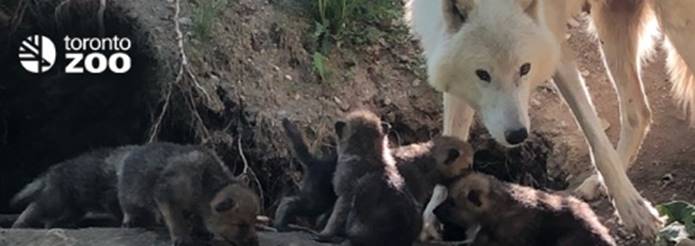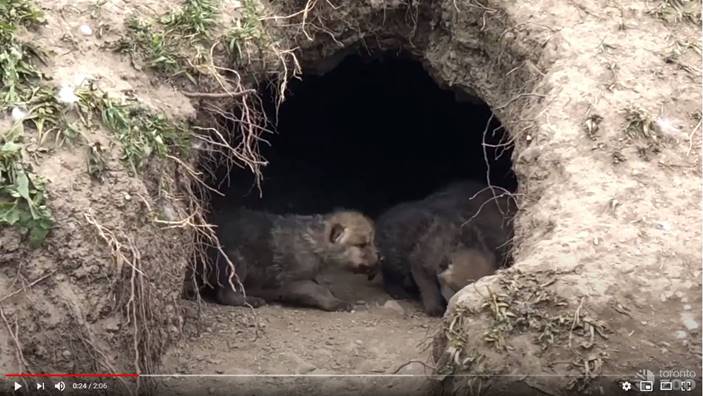
TORONTO ZOO ARCTIC WOLF UPDATE
TORONTO, ON, Monday, May 11, 2020: For the past several weeks, Wildlife Care staff have been closely monitoring our Arctic wolf pack as both adult females had been displaying denning behaviours, and it was suspected that one, and potentially both, females had given birth to pups. Usually only the dominant pair breeds, however in areas where prey is plentiful, there can be multiple litters per pack. A typical pack of wolves consists of a dominant pair of breeders and their offspring from previous years. The behaviour of members of the pack is based on the hierarchical relationships of the individuals and it is not unusual behaviour for Arctic wolf females to exhibit aggressive behaviour when more than one female in a pack has a litter at the same time.
Unfortunately on Saturday, May 2, 2020, a fight took place between the dominant female ‘Dora’ and her sister ‘Vera’ in the habitat they share with their pack. Vera sustained serious injuries rendering her unable to stand or walk, and Wildlife Health and Wildlife Care staff were able to anesthetize and move Vera to the Wildlife Health Centre for testing and monitoring. The following day after extensive consultation with external specialist and zoo experts including a neurologist, it became evident that her injuries were too severe for her to ever rejoin a pack. With a heavy heart, Zoo staff made the necessary decision to euthanize Vera on Sunday May 3rd. The same day Dora, the dominant female who had also sustained visible neck and facial wounds, was anesthetized and temporarily moved to the Wildlife Health Centre to have her wounds cleaned and treated. She was returned to the pack on the same day.
It was important to return Dora back to the pack as soon as possible after receiving treatment, to ensure she could care for the pups. Last Sunday afternoon, Wildlife Care were able to visually confirm that three pups were seen emerging from Dora’s den, and also witness Dora moving two pups from Vera’s den over to her own.
Subsequent to treatment, Dora is recovering well and continues to be seen entering and exiting her den regularly. This is Dora’s third litter of pups since 2018, all sired by male ‘Imiq’. While we can confirm that wolf pups have been spotted, given they do not usually emerge from the den until approximately 8-12 weeks other than for short periods of time, we cannot confirm how many pups were born or exactly, how old they are at this time. The Toronto Zoo will provide updates on the wolf pups when they become available. The arctic wolf is an important ambassador for Canadian species and industrial development and climate change continues to threaten their food supply and the Arctic habitat they call home.
Your morning #pupdate! Arctic wolf pups have been spotted at the Toronto Zoo emerging from the den. Although we can't confirm how many pups there are in total, we anticipate that there could be up to eight.
While we can confirm that wolf pups have been spotted, given they do not usually emerge from the den until approximately 8-12 weeks other than for short periods of time, we cannot confirm how many pups were born or exactly, how old they are at this time. The Toronto Zoo will provide updates on the wolf pups when they become available. The arctic wolf is an important ambassador for Canadian species and industrial development and climate change continues to threaten their food supply and the Arctic habitat they call home.
Follow us on social media for more ‘pup’dates!
-30-
Media Contact Information:
Katie Gray
Toronto Zoo’s Manager of Strategic Communications
(416) 938-5283
[email protected]
Amanda Chambers
Supervisor of Strategic Communications
[email protected]

